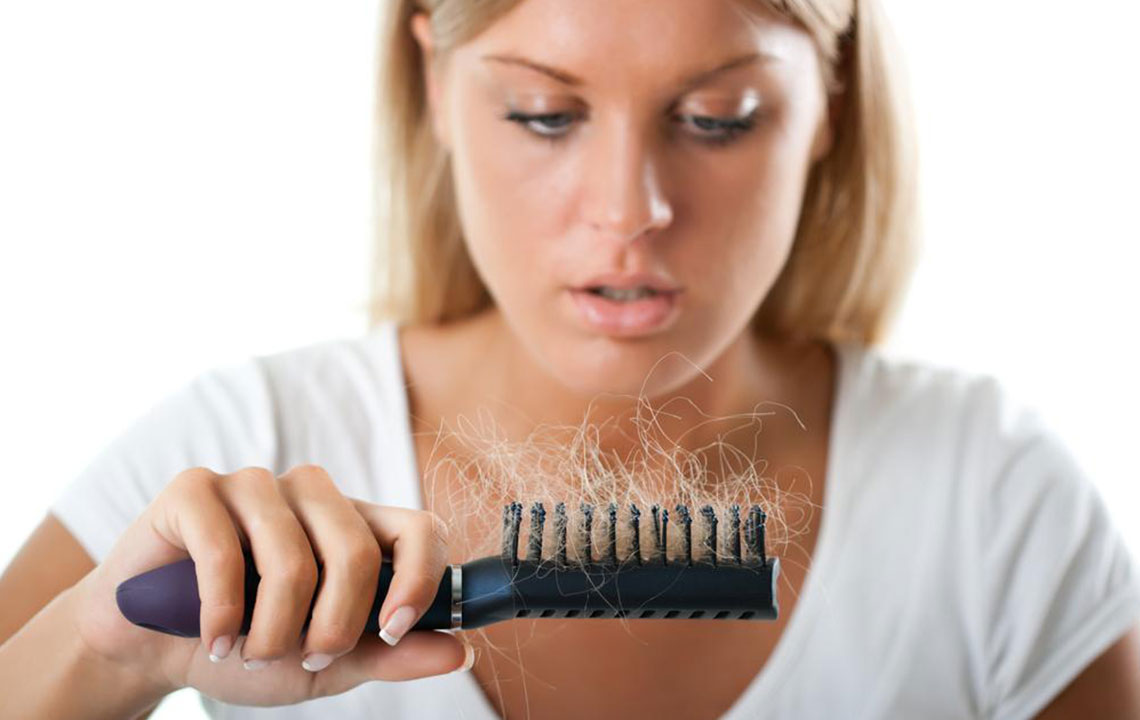8 Common Causes of Hair Loss in Women and Their Treatments

Hair loss can be a tremendously distressing situation as it impacts your overall appearance. But in most cases hair loss can be reversible, so you should not panic! If you are wondering how to stop hair loss, then you must begin by identifying its underlying causes. This is because for every woman the reasons for hair fall dramatically vary from each other. Getting an accurate diagnosis will help you to stop hair loss effectively at an early stage.
The following is a list of common causes of hair loss and their respective treatment options.
Inadequate protein intake
Protein is crucial for maintaining the health of your tresses. Consuming inadequate levels of protein can cease the growth of new hair as well as hamper existing ones by triggering hair loss.
Solution – This can be corrected by increasing your protein consumption. You can find rich protein content in meat, beans, seafood, green peas, seeds (chia, sesame, and sunflower), soy milk, eggs, tofu, green peas, etc.
Physical trauma
If your body has recently dealt with some form of physical trauma like a serious disease or injury due to an accident or otherwise, then there is a possibility of telogen effluvium occurring, which implies temporary hair loss. This is because your body suddenly has to deal with a high amount of stress. It could mostly continue for three months or more.
Solution – Since this is a natural response of the body, you will probably not need any medical treatments. As you recover, your hair growth patterns will gradually get back to normal. However, you can always seek professional advice for taking additional measures.
Genetics
Hair loss after a certain age could be a product of genetics. Usually, women in such situations suffer from considerable thinning of hair and loss of hair on the parting of the scalp.
Solution – A medical diagnosis will give you a better perspective about your treatment options. To stop hair loss, your doctor can prescribe you with medications. You can also use over-the-counter products to maintain the health of your existing hair, but before doing so have a word with your doctor.
Childbirth
Hair loss after child birth is a general scenario among women. This is because of two reasons. Firstly, because women face an immense level of stress while delivering a child. Secondly, pregnancy triggers significant biochemical changes in the body which can lead to the excessive shedding of hair.
Solution – This is a normal aspect of pregnancy. So, all you can do is wait for a few months for your hair to return to its usual growth patterns. Meanwhile, ensure that you eat well and exercise regularly.
Excessive consumption of vitamin A
Although vitamin A is essential for keeping the scalp moisturized, an excessive intake of it can cause noticeable hair fall. This can mostly happen when you are consuming vitamin A supplements. It occurs as vitamin A speeds up hair’s natural growth and shedding phase.
Solution – To stop hair loss, you should discontinue your vitamin A supplemental intake and turn towards natural sources of it. This will help the scalp to normalize back to an acceptable shedding phase.
Unwarranted hairstyling
Any forms of harsh styling methods using straightening devices, chemicals, high heat or tight braiding can eventually lead to hair loss. Such trendy hairstyles can permanently damage your hair roots.
Solution – Tone down on using devices such as hair dryer or straighteners. Instead just simply use a good shampoo and conditioner to clean and nourish your hair. You can also occasionally make use of essential oils or head massages to stimulate hair growth on the scalp. Lastly, to stop hair loss, you must refrain from extreme styling methods as they will only backfire in the long run.
Anemia
Currently, anemia (iron deficiency) is a very common form of health condition among women. Apart from hair loss, it can also cause headaches, pastel skin, cold hands, exhaustion, and wooziness.
Solution – Medical intervention for anemia is necessary to prevent further aggravation of the condition. Your doctor will confirm your diagnosis with a blood test. If you test positive for anemia, then you will be prescribed with iron supplements and a revised diet sheet.
Medications
Certain types of medications such as antidepressants, blood thinners, NSAIDs, etc. might cause hair loss. Birth control pills can also create a temporary imbalance in hormone levels.
Solution – Seek the assistance of your doctor, so that he/she could alter your medications of dosages. However, remember not to cease such medications without your physician’s authorization.
Hypothyroidism
Hypothyroidism refers to an underactive thyroid gland. In such situations, the gland is unable to produce adequate hormones in the body which can cause hair loss.
Solution – To stop hair loss and other symptoms of hypothyroidism you will have to seek the assistance of prescribed medication. Once your hormonal balance is restored, your hair will start growing properly.
These are effective solutions if you are wondering how to stop hair loss.



